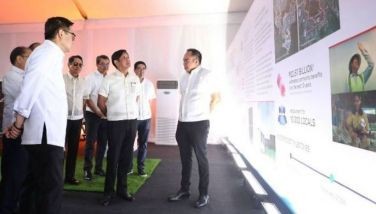AC Energy’s BioPower group seeks FIT rates for Negros biomass plants
MANILA, Philippines — The BioPower group under AC Energy Inc. is eyeing to secure feed-in tariff (FIT) rates for all its three biomass plants in Negros Island that are targeted for commercial operations by the end of the year.
The three biomass projects worth P16 billion will generate 70 megawatts (MW) of baseload capacity fueled primarily by sugarcane field residues sourced within the same region.
San Carlos BioPower (SCBP), one of the three BioPower plants under construction, was able to reach a generation capacity of 20 MW on Sept. 21. It is the first in the world to purely run on sugarcane trash.
“The plant has accomplished its proof of concept from the logistical system of sugarcane trash collection to the conversion to electricity,” BioPower president Arthur Aguilar said.
Meanwhile, two more biomass power plants – namely North Negros BioPower (NNBP) and South Negros BioPower (SNBP) – will be connecting to the grid within the year.
“The team is pleased to finally have SCBP connect and export power to the grid. Our goal is to have all three of our plants running by end of this year and improve the quality of power in the island of Negros,” Aguilar said.
The plants will be supported by 12 BioPower-owned and – operated transloading stations, strategically located in the Negros region to annually collect and utilize more than 610,000 tons of feedstock as fuel.
The biomass projects in Negros have provided substantial countryside development in host communities, while also adding income to local farmers.
BioPower’s collection of cane trash is as important as bagasse feedstock for fuel. It adds value to diversifying the sugar industry and mitigate the practice of open field burning, without additional investment from planters.
“We have among the largest agricultural fleet to have sufficient collection capabilities for fuel inventory, while also having around 1,500 employees to support our day-to-day operations,” Aguilar said.
BioPower’s utilization of cane trash will provide 510 gigawatt hours (GWh) of energy on its first year of operation, estimated to power 160,000 homes and a reduction of 57,680 tons carbon emissions.
All three BioPower plants are vying to be eligible in the FIT system for biomass.
The FIT system details perks for power developers for a period of 20 years to invest in the more expensive renewable sector. Payment for FIT-eligible projects are shouldered by all on-grid electricity consumers through a uniform charge called FIT-All.
Unlike solar and wind, the FIT allocation for biomass and run-of-river technologies remain undersubscribed three years after the program’s implementation so the Department of Energy (DOE) extended the deadline to meet the allocation until end of the year from the original Dec. 31, 2017 deadline.
Biomass was originally approved a rate of P6.63 per kilowatt-hour (kwh) with an installation target of 250 MW. The FIT rate has already been reduced to P6.5969 per kwh for biomass effective 2018.
The BioPower group is spearheaded by Negros Island Biomass Holdings Inc. (NIBH) and funded by global investment firm ThomasLloyd.
In 2017, Bronzeoak and NIBH were incorporated into the Ayala Corp. under its power business AC Energy Inc.
- Latest
- Trending



























